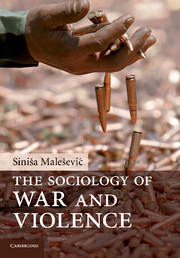Book contents
- Frontmatter
- Contents
- Acknowledgments
- Introduction: war, violence and the social
- Part I Collective violence and sociological theory
- 1 War and violence in classical social thought
- 2 The contemporary sociology of organised violence
- Part II War in time and space
- Part III Warfare: ideas and practices
- Part IV War, violence and social divisions
- Part V Organised violence in the twenty-first century
- Conclusion
- References
- Index
1 - War and violence in classical social thought
Published online by Cambridge University Press: 05 June 2012
- Frontmatter
- Contents
- Acknowledgments
- Introduction: war, violence and the social
- Part I Collective violence and sociological theory
- 1 War and violence in classical social thought
- 2 The contemporary sociology of organised violence
- Part II War in time and space
- Part III Warfare: ideas and practices
- Part IV War, violence and social divisions
- Part V Organised violence in the twenty-first century
- Conclusion
- References
- Index
Summary
Introduction
Most contemporary commentators reproach the classical sociologists for ignoring the study of warfare and collective violence (Shaw 1984; Marsland 1986: 8; Giddens 1985; Scruton 1987a; 1987b; Mann 1988: 147; Joas 2003). Ashworth and Dandeker state that given the ubiquity of war and violence in human history ‘it is remarkable that its study has remained largely at the periphery of sociological analysis’ (1987: 1). The most common reason identified for this neglect is the foundational heritage of the Enlightenment, purportedly shared by all major social theorists, which conceptualised modernity in terms of universal rationality, economic growth, scientific progress and peace (Tiryakian 1999: 474–8; Joas 2003). Rather than being seen as a regular and structurally intrinsic feature of social life, war and violence were largely perceived as irrational, atavistic facets of the primeval era that were bound to disappear with the arrival and spread of modernity. Although there is some truth in these criticisms, the judgment is both too severe and too hasty. The apparent neglect has less to do with classical social thought itself and much more to do with developments in social and political thinking after World War II (WWII). The central premise of this chapter is that classical social thought was not, by and large, ignorant of war and violence. Instead it is the hegemony of anti-militarist social theory in the second half of the twentieth century that has cleansed sociology from the study of warfare by simultaneously ignoring its rich and versatile ‘bellicose’ tradition and by reinterpreting the classics in strictly ‘pacifist’ terms.
- Type
- Chapter
- Information
- The Sociology of War and Violence , pp. 17 - 49Publisher: Cambridge University PressPrint publication year: 2010
- 1
- Cited by



